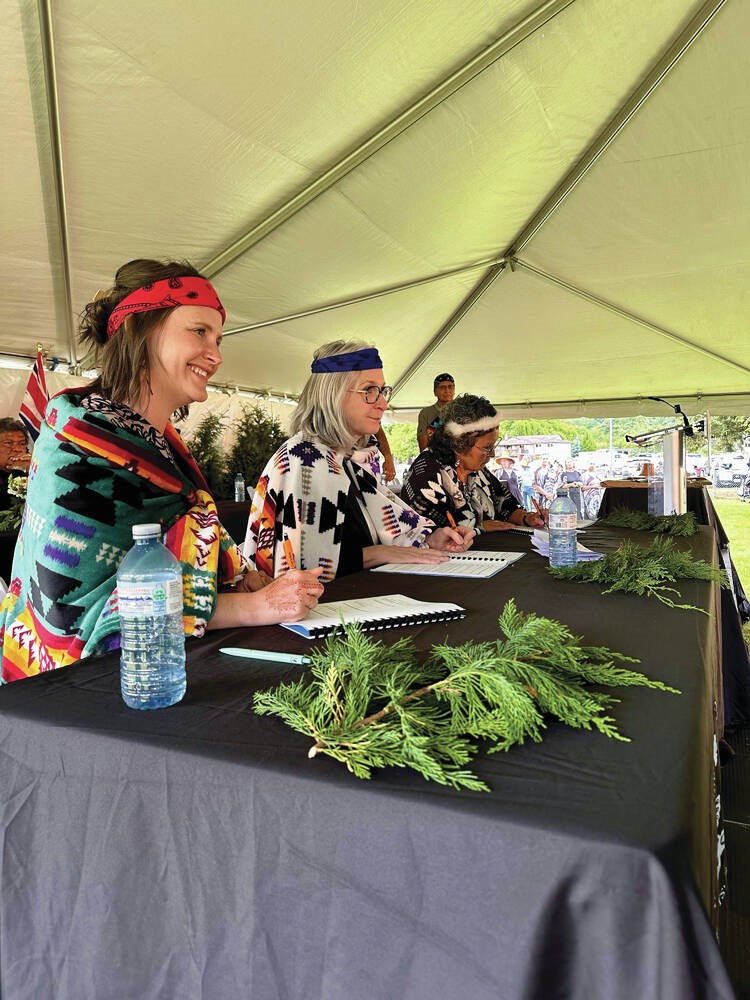As the Cowichan Tribes assumes control over its child and family services, it plans to leave behind the practice of child apprehension that its chief says has traumatized members of her nation for generations.
“Today, we are making history,” said Chief Cindy Daniels of the Cowichan Tribes, Vancouver Island’s most populous First Nation.
“We are putting in place our law.”
Representatives from Cowichan Tribes, saąúĽĘ´«Ă˝ and saąúĽĘ´«Ă˝ officially signed a tripartite agreement on Monday under a tent on the soccer fields next to the community’s Si’em Lelum Gymnasium.
The agreement allows for Cowichan Tribes to assume full management of all aspects of child and family services for its community, including prevention, protection measures and operations.
Daniels, whose traditional name is Sulsulxumaat, said her thoughts were with the generations of Cowichan children who experienced the trauma of being removed from their families and their community.
Cowichan Tribes will not practice child apprehension and placements “that have alienated children from their families and our community for generations,” she said.
Grace Lore, saąúĽĘ´«Ă˝’s minister of children and family development, said state intervention in Indigenous families has a long history of causing harm, from residential schools to the Sixties Scoop.
Lore said the agreement means her ministry will no longer oversee Cowichan Tribes child and family services as of Aug. 1.
“By recognizing their inherent right to jurisdiction, we do not have oversight. The services are provided by the Nation for Nation members from prevention to protection, provided by Cowichan Tribes in accordance with Cowichan law,” she said. “They never gave up the responsibility and honour of caring for their kids and families.”
Federal Minister of Indigenous Services Patty Hajdu, representing saąúĽĘ´«Ă˝, said the agreement allows the Cowichan Tribes to take back control of their child and family services, “something that should have never been taken away in the first place.”
The Cowichan Tribes have been pushing for child and family services to be under its control since 2020, after the passage of the federal government’s Bill C-92 in 2019 allowed for Indigenous groups to assume full jurisdiction over child and family services.
Cowichan citizens voted last November to reclaim child services from saąúĽĘ´«Ă˝ and for Cowichan Tribes regulations concerning its child and family services to prevail over federal or provincial law in cases of disagreement.
Nation-provided service will initially cover Vancouver Island and the Gulf Islands.
Lore said her ministry will continue to be involved in cases that involve Cowichan members in other parts of the province not covered by the agreement.
The nation’s child protection services will be managed by a services authority named Stsi’elh stuhw’ew’t-hw tun Smun’eem, which is in the process of appointing a CEO, the province said.
Cowichan Tribes council will regulate, support and ensure that the authority functions properly but will otherwise be uninvolved in day-to-day operations and case decisions.
The Cowichan Tribes have delivered prevention and protection services through its child and family service, Lalum’utul’ Smun’eem, since 1993.
The agency currently operates under the authority of the provincial government.
Indigenous children are vastly over-represented in foster care in saąúĽĘ´«Ă˝, making up 53.8 per cent of children under 14 in care, despite the fact they are just 7.7 per cent of the population under 14, according to 2021 census data.
>>> To comment on this article, write a letter to the editor: [email protected]



